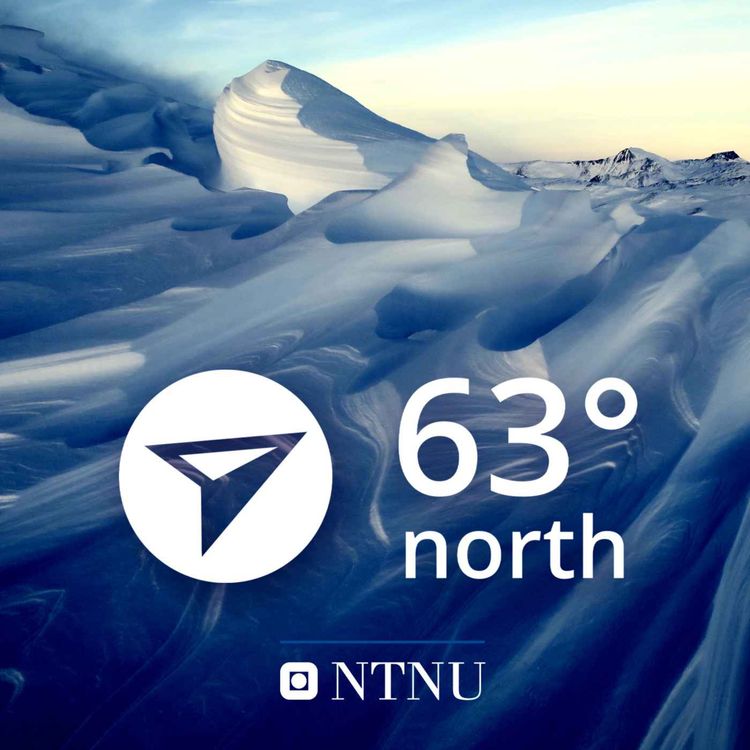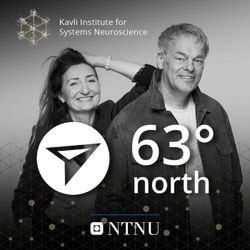Share

63 Degrees North
Hermann Göring’s Luftwaffe and the $6 billion deal
How the unlikely combination of WWII Germany, a modest English engineer who created a worker’s paradise, an ambitious industrialist prosecuted as a traitor and a hardworking PhD helped build modern Norway, one aluminium ingot at a time.
Today's guests are Hans Otto Frøland, Svein Richard Brandtzæg and Randi Holmestad. Frøland is one of the researchers working in the Fate of Nations project, which is based at NTNU and focused on the global history and political economy of natural resources. To see archival photographs related to the episode, check out this companion article in Norwegian SciTech News.
You can read more about the history of aluminium in Norway here:
From Warfare to Welfare: Business-Government Relations in the Aluminium Industry (2012) Frøland, Hans Otto; Ingulstad, Mats
Akademika Forlag
Frøland, Hans Otto; Kobberrød, Jan Thomas. (2009) The Norwegian Contribution to Göring's Megalomania. Norway's Aluminium Industry during World War II. Cahiers d'histoire de l'aluminium. vol. 42-43.
Frøland, Hans Otto. (2007) The Norwegian Aluminium Expansion Program in the Context of European integration, 1955-1975. Cahiers d'histoire de l'aluminium.
Gendron, Robin S.; Ingulstad, Mats; Storli, Espen. (2013) Aluminum Ore: The Political Economy of the Global Bauxite Industry. University of British Columbia Press. 2013. ISBN 978-0-7748-2533-7.
More episodes
View all episodes

34. What babies can tell us – and why we need to listen
41:55||Season 5, Ep. 34If you've ever seen an infant lying on its back, you've surely seen them endlessly waving their arms and legs in seemingly haphazard ways. And crying? To the uneducated eye and ear, it does all seem a little... unplanned. But from their earliest moments, infants actually cry in a way that suggests they're already learning the patterns of their mother's language while in the womb! And when you see them waving their arms around? They're actually deliberately trying to figure out what this thing is on the end of their arm, and how can they get it to do what they want?The way babies move not only tells us loads about healthy infant development, but about whether things might not be quite right, especially when it comes to problems such as cerebral palsy.Today's guests help us decode the meanings of these movements, why they matter, and what parents in particular need to know to help stimulate their babies' development in the best possible way.Our first guest, Audrey van der Meer, a professor of neuropsychology, is interested in how an infant makes sense of the world, and how we can encourage that learning to give our children the best start. Our second guest, Lars Adde, has spent his entire career working with infants in neonatal intensive care units, and is pioneering new ways to speed the detection of cerebral palsy as early as possible.You can read more about Audrey's work at the NuLab here, where you can also see a trailer for a Netflix series on babies in which Audrey is one of the experts for the episode called "Movement". You can also visit this page to see some of the lab's seminal publications.Lars's collaboration with AI researchers, called DeepInMotion, is featured here. A three-minute video describing his research can be found here.The webpage for his startup, In-Motion Technologies, can be found here. Here's a link to a transcript of the show.If you've listened to the very end of this episode, you'll hear that this is the last ever episode of 63 Degrees North! Thanks to all of you listeners, and stay tuned! You never know where I might pop up next.Questions, comments? Contact me at nancy.bazilchuk@ntnu.no
33. ENCORE: When the doctor is out
34:06||Season 5, Ep. 33ENCORE: This episode was first published in Oct. 2023. Sierra Leone used to be the most dangerous place in the world to give birth. Without enough doctors to do C-sections, women and babies were dying. But what if you didn't need a doctor?This week, the story of two determined surgeons and a no-so radical idea that is saving lives in Sierra Leone — one emergency operation at a time.You can read more about the non-profit organization the doctors created at capacare.orgOur guests on the show are Håkon Bolkan, Alex van Duinen and Emmanuel Tommy. You can download the episode transcript here:Here are some of the articles discussed in the show:Bolkan, HA et al. (2015) Met and unmet need for surgery in Sierra Leone: a comprehensive retrospective countrywide survey from all healthcare facilities performing surgery in 2012. SurgeryBrolin, K et al. (2016) The Impact of the West Africa Ebola Outbreak on Obstetric Health Care in Sierra Leone. PLOS ONEBolkan, HA et al.. (2017) Safety, productivity and predicted contribution of a surgical task-sharing programme in Sierra Leone. British Journal of SurgeryTreacy, Laura; Bolkan, Håkon Angell; Sagbakken, Mette. (2018) Distance, accessibility and costs. Decision-making During Childbirth in Rural Sierra Leone: a Qualitative Study. PLOS ONEDrevin, Gustaf; Alvesson, Helle Mölsted; van Duinen, Aalke Johan; Bolkan, Håkon Angell; Koroma, Alimamy philip; von Schreeb, Johan. (2019) ”For this one, let me take the risk”: why surgical staff continued to perform caesarean sections during the 2014–2016 Ebola epidemic in Sierra Leone. BMJ Global Healthvan Duinen, Aalke Johan; Kamara, Michael M.; Hagander, Lars; Ashley, Thomas; Koroma, Alimamy Philip; Leather, Andy J.M.. (2019) Caesarean section performed by medical doctors and associate clinicians in Sierra Leone. British Journal of Surgeryvan Duinen, Aalke Johan; Westendorp, Josien; Kamara, Michael M; Forna, Fatu; Hagander, Lars; Rijken, Marcus J.. (2020) Perinatal outcomes of cesarean deliveries in Sierra Leone: A prospective multicenter observational study. International Journal of Gynecology & Obstetrics
32. ENCORE: Running rats and healing hearts
34:36||Season 5, Ep. 32ENCORE: This episode was first published in Sept. 2023.In 1998, a young Norwegian exercise physiologist found that a technique he had used to help Olympic athletes could help heart patients too. But his idea made doctors sweat. One famous cardiologist told him that if he used his technique in human heart attack patients, he "would kill them."Today's show looks at what happened when our researcher, Ulrik Wisløff, defied the experts — and built a career learning how high intensity interval training can help everyone from heart patients and ageing Baby Boomers, and possibly even Alzheimer's patients — but not in the way you might think!Today's guests are Ulrik Wisløff, Dorthe Stensvold and Atefe Tari.Here's a link to a rat on a treadmill photo. And here's a link to a transcript.Here's a list of some of the research mentioned in the podcast:Wisløff U, et al. Intensity-controlled treadmill running in rats: VO(2 max) and cardiac hypertrophy. Am J Physiol Heart Circ Physiol. 2001 Mar;280(3):H1301-10.Wisløff U,et al. Superior cardiovascular effect of aerobic interval training versus moderate continuous training in heart failure patients: a randomized study. Circulation. 2007 Jun 19;115(24):3086-94. doi: 10.1161/CIRCULATIONAHA.106.675041. Epub 2007 Jun 4.Rognmo, Ø et al.. Cardiovascular Risk of High- Versus Moderate-Intensity Aerobic Exercise in Coronary Heart Disease Patients Circulation. 2012;126:1436-1440. doi: 10.1161/CIRCULATIONAHA.112.123117Stensvold D, Viken H, Steinshamn S L, Dalen H, Støylen A, Loennechen J P et al. Effect of exercise training for five years on all cause mortality in older adults—the Generation 100 study: randomised controlled trial BMJ 2020; 371 :m3485 Tari AR, Nauman J, Zisko N, Skjellegrind HK, Bosnes I, Bergh S, Stensvold D, Selbæk G, Wisløff U. Temporal changes in cardiorespiratory fitness and risk of dementia incidence and mortality: a population-based prospective cohort study. Lancet Public Health. 2019 Nov;4(11):e565-e574.Tari AR, Berg HH, Videm V, Bråthen G, White LR, Røsbjørgen RN, Scheffler K, Dalen H, Holte E, Haberg AK, Selbaek G, Lydersen S, Duezel E, Bergh S, Logan-Halvorsrud KR, Sando SB, Wisløff U. Safety and efficacy of plasma transfusion from exercise-trained donors in patients with early Alzheimer's disease: protocol for the ExPlas study. BMJ Open. 2022 Sep 6;12(9):e056964.
31. Walrus tusks were Viking age gold
30:23||Season 5, Ep. 31Historians have floated a half-dozen theories for why Viking Greenland settlements suddenly vanished in the 1300s and 1400s, after nearly 500 years of occupation. Was it climate change, the Black Death, even bad farming habits learned in Scandinavia?But what if…it all came down to walrus ivory? It turns out that walrus tusks during the Viking and Middle Ages fuelled a long-distance trade network that stretched from Inuit hunters far above the Arctic Circle to churches and royalty in cities as far flung as Novgorod, Kyiv and Cologne. Now, using ancient DNA and isotope analysis, archaeologists have shown that virtually all these tusks came from Greenland!And then suddenly, the market collapsed. What happened?Today's show looks at how everything from cutting edge technology to dogged footwork has allowed researchers to piece together the details of the global walrus trade a thousand years back in time. They're also using this window into the past to better understand walruses themselves, to make predictions about the future of walruses in a warming world.My guests on today's show are James Barrett, professor of medieval and environmental archaeology at the NTNU University Museum, and Katrien Dierickx and Erin Kunisch, postdocs with James and the 4-Oceans project.Here's a link to the NTNU University Museum's new exhibit on the walrus tusk trade, Sea Ivories. The exhibition includes the Wingfield-Digby Crozier, from the Victoria & Albert Museum, plus several Lewis Chessmen, from the British Museum.Here's a link to photos and a description of a Romanesque walrus ivory carving, the Cloisters Cross. Here's a link to a Gothic-style carving of elephant ivory.Here are some relevant academic articles:Barrett, James; Boessenkool, Sanne; Kneale, Catherine; O'Connell, Tamsin C; Star, Bastiaan. (2020) Ecological globalisation, serial depletion and the medieval trade of walrus rostra. Quaternary Science ReviewsBarrett, James; Khamaiko, Natalia; Ferrari, Giada; Cuevas, Angelica; Kneale, Catherine; Hufthammer, Anne Karin. (2022) Walruses on the Dnieper: new evidence for the intercontinental trade of Greenlandic ivory in the Middle Ages. Proceedings of the Royal Society of London. Biological SciencesKeighley, X et al.Disappearance of Icelandic Walruses Coincided with Norse Settlement, Molecular Biology and Evolution, 36:12, Dec.2019, p2656–2667, https://doi.org/10.1093/molbev/msz196Transcript
30. An accidental discovery: From failed experiment to new antibiotic
28:03||Season 5, Ep. 30NTNU professor Marit Otterlei nearly threw out the contaminated cell culture where she and her colleagues were testing a new cancer drug.The problem arose on a hot summer day, in Trondheim, in a country not known for hot summer days. So they'd opened the lab's windows overnight.When they came back the next day, they found an uninvited guest, snuggled in with their cancer cell culture: Bacteria!!!Here's the thing, though: although the drug had been designed to work on human cancer cells, it looked like it had killed the bacteria, too!That was remarkable, because the cancer drug targeted a specific mechanism that human cells use to replicate. It looked like the drug also targeted the same mechanism in bacteria -- even though the tree of life had branched away from bacteria 3 BILLION years ago! How could that be?Today's podcast takes a peek into the challenging world of what it takes to bring a drug, especially an antibiotic, to market. But it’s also an inside look into how some researchers, with their deep curiosity about the nuts and bolts of how life actually works, can come up with startling discoveries that may someday save our lives. Sometimes, the key to saving lives can be hidden in a protein that hasn't changed much over billions of years.Our guests on today's show are Marit Otterlei, a professor at NTNU's Department of Clinical and Molecular Medicine; Siril Skaret Bakke, innovation manager at NTNU's Technology Transfer Office AS, and Christine Årdal , senior researcher at the Norwegian Institute of Public Health.Marit is a part-time CSO at APIM Therapeutics (https://www.apimtherapeutics.com/), which is developing the cancer drug that she was testing back in 2011, when an open window on a hot summer day led her to suspect that her substance might a possible antibiotic, too. That antibiotic, Betatide, is now undergoing testing that pharmaceutical companies require before investing in it.Here's a list of some of the key academic publications:Gilljam, Karin Margaretha; Feyzi, Emadoldin; Aas, Per Arne; Sousa, Mirta; Müller, Rebekka; Vågbø, Cathrine Broberg. (2009) Identification of a novel, widespread, and functionally important PCNA-binding motif. Journal of Cell BiologyNedal, Aina; Ræder, Synnøve Brandt; Dalhus, Bjørn; Helgesen, Emily; Forstrøm, Rune Johansen; Lindland, Kim. (2020) Peptides containing the PCNA interacting motif APIM bind to the beta-clamp and inhibit bacterial growth and mutagenesis. Nucleic Acids Research (NAR)Nepal, Anala; Ræder, Synnøve Brandt; Søgaard, Caroline Krogh; Haugan, Maria Schei; Otterlei, Marit. (2021) Broad-Spectrum Antibacterial Peptide Kills Extracellular and Intracellular Bacteria Without Affecting Epithelialization. Frontiers in Microbiology
29. New clues from old bones: Norwegian Vikings were very, very violent
31:27||Season 5, Ep. 29We may think the Vikings were all the same, but it turns out that Viking violence wasn’t the same everywhere. New research shows that Norwegian Vikings were buried with 50 times more weapons—and had a lot more injuries—than their neighbours in Denmark. And there were other dramatic differences that researchers were able to uncover, even after the passage of more than a thousand years.This episode digs into what those differences might mean. Why were Norwegian Vikings more violent? Was something going on in their society? And were swords really the handguns of Viking society?My guests on today's show were Lisa Mariann Strand, a PhD research fellow at NTNU, Jan Bill, an archaeologist at the University of Oslo and David Jacobson, a sociologist at the University of South Florida.You can read about Bill's project studying the Gokstad ship here, and you can see picture and description of the ship on the webpages of the Museum of the Viking Age here.Here are some links to the articles we discussed in the show:Jan Bill, David Jacobson, Susanne Nagel, Lisa Mariann Strand (2024)Violence as a lens to Viking societies: A comparison of Norway and Denmark, Journal of Anthropological Archaeology,Volume 75, 2024, 101605, ISSN 0278-4165, https://doi.org/10.1016/j.jaa.2024.101605Lisa Mariann Strand, Sam Leggett, Birgitte Skar Multi-isotope variation reveals social complexity in Viking Age Norway, iScience, Volume 25, Issue 10, 2022, 105225,ISSN 2589-0042, https://doi.org/10.1016/j.isci.2022.105225.Margaryan, A., Lawson, D.J., Sikora, M. et al. Population genomics of the Viking world. Nature 585, 390–396 (2020). https://doi.org/10.1038/s41586-020-2688-8Questions? Comments? You can contact me at nancy.bazilchuk@ntnu.no
28. Old flames die hard – the saga of solar cookers
21:19||Season 5, Ep. 28Jimmy Chaciga, a PhD research fellow at Makerere University in Uganda, thinks he has what it will take to get Ugandan households to adopt solar-powered cookers. First, cookers need to be simple to operate. They need to be cheap. They need to be able to cook once the sun has gone down.But most of all, they need to be able to cook beans."If you can cook beans, you can cook anything," he says.Armed with two drums, a lot of insulation, some solar panels and a dream, Chaciga is trying to bring his cooker to Ugandan households and institutions that need it the most.Chaciga is one of a group of African researchers working with NTNU's Ole Jørgen Nydal under projects funded by NORAD, the Norwegian Agency for International Development, and the University Network on PhD Programmes in Energy Technology (UNET), co-funded by the EU's Erasmus + programme.Here's the situation: After decades of research and funding to help households in developing countries shift away from firewood, charcoal and other biomass, 75% continue to rely on these resources for cooking. Clearly, cooking with wood is bad. It wastes women and children's time as they scavenge scarce wood to burn.It contributes to deforestation. It's a huge problem that seems like it should be solvable with enough smart engineering, yet it persists.Today's episode explores the successes and challenges researchers have faced in tackling this issue.My guests are Jimmy Chaciga, Ashmore Mawire and Ole Jørgen Nydal.You can see videos and documents from the International Energy Agency's Clean Cooking Summit from May 2024 here.Here are some publications describing some of the work in today's show:Chaciga, Jimmy; Nyeinga, Karidewa; Okello, Denis; Nydal, Ole Jørgen. (2024) Design and experimental analysis on a single tank energy storage system integrated with a cooking unit using funnel system. Journal of Energy StorageNydal, Ole Jørgen. (2023) Heat Storage for Cooking: A Discussion on Requirements and Concepts. EnergiesCooking with solar ovens in sub-Saharan Africa, Norwegian SciTech NewsHere are some background documents that describe the problem over time:Joseph Elasu, et al.(2023) Drivers of household transition to clean energy fuels: A systematic review of evidence,Renewable and Sustainable Energy Transition.World Bank. (2011). Household Cookstoves, Environment, Health, and Climate Change: A New Look at an Old Problem. Washington, DC: World Bank.Ideas? Feedback? Email me at nancy.bazilchuk@ntnu.no
27. From Running Rats to Brain Maps: A Nobel Odyssey
37:36||Season 4, Ep. 27When the phone rang 10 years ago while Norwegian neuroscientist May-Britt Moser was in a particularly engaging lab meeting, she almost didn't answer it.Good thing she did! It was Göran Hansson, secretary of the Nobel Committee for Physiology or Medicine, with the news: May-Britt Moser and Edvard Moser, along with their mentor and colleague John O’Keefe from the University College London, had just won the Nobel Prize in Physiology or Medicine for their discoveries of two types of brain cells that work together to function like a GPS in the brain.That system allows animals -including us - to know where they are, and navigate to where they want to go. This was a groundbreaking discovery because it gave us critical insight into how an area of the brain, far from the normal sensory inputs of sight, sound and touch, constructs its own way of understanding space. And, because this same area of the brain, and our ability to navigate, are affected early on in Alzheimer's patients, it offers an inroad for clinicians studying the disease. In fact, the KG Jebsen Centre for Alzheimer's Disease, a part of the Mosers' Kavli Institute, is working to bring these fundamental insights about the brain to clinical practice.This episode is a celebration of the 10th anniversary of the Nobel award.To make it, I cracked open a time capsule of sorts: When the Mosers first learned that they had won the scientific world's highest honour, I ran down to their lab and recorded everything! The files in this podcast are from that day and the heady days afterwards.My guests on today's episode are May-Britt Moser and Edvard Moser.You can also find lots more material, including videos, more popular science articles and background information on this webpage.
26. Cathedral at the end of the world
25:44||Season 4, Ep. 26Nobelmen and women, in fancy clothing and pearls – but with dragon wings and tails. A laughing man with a full head of curly hair. Lions biting the ears off a man whose mouth is full of writhing serpents. These may sound like a weird combination of a gothic novel and a nightmare, but they're something completely different – a description of some of the eerie and surprising sculptures in Nidaros Cathedral, the northernmost gothic cathedral in the world that's located in NTNU's hometown of Trondheim.But what were the messages that stonemasons and religious leaders were trying to send visitors to the cathedral – and how do we interpret these messages 800 years later?My guests on today's show are Øystein Ekroll, chief archaeologist and researcher at the Nidaros Cathedral Restoration Workshop and Margrete Syrstad Andås, an art historian and associate professor at NTNU's Department of Art and Media Studies.You can read more about the history of the cathedral in this article from Norwegian SciTech News: Thousand-year-old cathedral surrenders its secrets, stone by stoneØystein Ekroll has an article about the building history of the cathedral from 1030 to 1537 that you can find here.Øystein's PhD dissertation is available here: The Octagonal Shrine Chapel of St Olav at Nidaros CathedralØystein and Margrete have also edited a book about the cathedral:Andås, Margrete Syrstad, Øystein Ekroll Andreas Haug and Nils Holger Petersen, eds,The Medieval Cathedral of Trondheim: Architectural and Ritual Constructions in their European Context (Traditions and Transformations 3), Turnhout, Brepols, 2007Andås, Margrete Syrstad. “Art and Ritual in the Liminal Zone.” In he Medieval cathedral of Trondheim : architectural and ritual constructions in their European context. Eds. Margrete Syrstad Andås, Øystein Ekroll, Andreas Haug and Nils Holger Petersen. Turnhout 2007: 47–126.Andås, Margrete Syrstad. ”The Octagon Doorway: A Question of Purity and Danger?” In Ornament and Order. Essays on Viking and Northern Medieval Art for Signe Horn Fuglesang. Edited by Margrethe C.Stang and Kristin B. Aavitsland, 97-134. Trondheim: Tapir, 2008.Like what you're hearing? Leave a review, tell your friends, subscribe! And you can contact me, Nancy Bazilchuk, with feedback at nancy.bazilchuk@ntnu.no